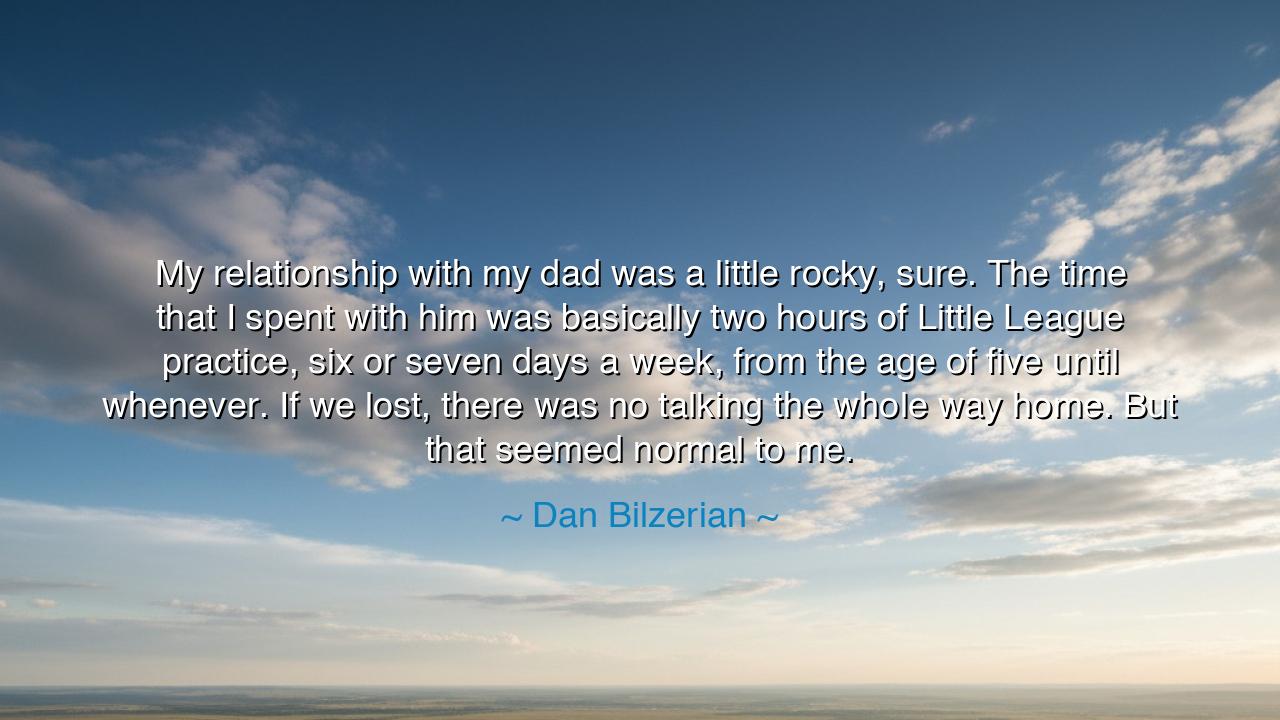
My relationship with my dad was a little rocky, sure. The time
My relationship with my dad was a little rocky, sure. The time that I spent with him was basically two hours of Little League practice, six or seven days a week, from the age of five until whenever. If we lost, there was no talking the whole way home. But that seemed normal to me.






“My relationship with my dad was a little rocky, sure. The time that I spent with him was basically two hours of Little League practice, six or seven days a week, from the age of five until whenever. If we lost, there was no talking the whole way home. But that seemed normal to me.”
Thus spoke Dan Bilzerian, a man known to the modern age for his extravagance, but whose words here reveal something deeper and far more human. Behind the glittering armor of confidence lies the echo of a child who learned early that love and achievement were intertwined, that approval was not freely given but earned through victory. In his confession, there is a universal truth—one that speaks of fathers and sons, of the silent distances that can grow between generations when affection is chained to performance.
When Bilzerian recalls those long drives in silence, he is not merely describing a moment of childhood; he is painting a portrait of expectation. His father, like many men of his time, believed in the gospel of discipline—that a boy becomes strong only through the fires of challenge. Yet in the pursuit of strength, something tender was lost: the freedom to fail without fear, to fall and still be loved. To the child, this seemed normal, because the heart learns to accept what it knows, even when it aches. And so, beneath the armor of ambition, the seed of loneliness was sown.
The ancients would have understood this paradox. In the legends of Greece, Achilles was trained by Chiron, a stern master who demanded excellence. The young warrior grew fierce and unmatched in battle, but his life was haunted by pride and isolation. His greatness came at the cost of peace. So too, many sons through history have borne the weight of a father’s unspoken dream, striving endlessly for an embrace that never came. Such men grow into conquerors of the world, yet remain strangers to themselves.
There is, however, another side to this story—the inheritance of drive. The same father who withheld praise also gave his son the gift of endurance. The boy who was taught to face defeat in silence learned the strength to push through pain. In a world that exalts comfort, those who have tasted discipline in their youth often become unbreakable. Yet even this strength must be tempered with wisdom, lest it harden into arrogance or emptiness. For power without understanding is like a sword without a hilt—it cuts the one who wields it.
To recognize that what once seemed “normal” was, in truth, wounding, is a form of awakening. It is the beginning of reconciliation—not only with the past, but with oneself. The man who sees his childhood clearly has the chance to become what his father could not: a bridge between strength and compassion. Bilzerian’s words, whether knowingly or not, reveal this opportunity—to understand that love cannot be measured by victories, nor silence mistaken for respect. True manhood lies not in domination, but in the courage to feel, to forgive, to break the inherited cycle of coldness.
History gives us luminous examples of such transformation. The emperor Marcus Aurelius, raised among warriors and philosophers, spoke often of his father’s discipline but tempered it with mercy. In his Meditations, he wrote that to be just and gentle was not weakness, but the highest form of strength. The lesson he passed to his son, Commodus, was one of restraint—but alas, the boy did not heed it. Thus, we see how fragile the transmission of virtue can be, and how each generation must choose anew whether to repeat or redeem the past.
So, children of tomorrow, hear this: love and discipline are both sacred, but one must never strangle the other. Teach the young to strive, but also to rest. Celebrate their effort, not only their triumphs. If you were raised in silence, learn to speak; if you were trained in severity, learn to soften. The warrior who cannot love is half a man, just as the lover who cannot endure is incomplete. True wisdom lies in the union of both.
Practical teaching: Reflect upon your upbringing with honesty, not resentment. If you were hardened by harshness, let it teach you resilience—but do not pass the same wound to others. Speak praise where silence once ruled. Show warmth where coldness once dwelt. For as Dan Bilzerian’s story reveals, strength without tenderness builds walls, but strength guided by love builds legacies.






AAdministratorAdministrator
Welcome, honored guests. Please leave a comment, we will respond soon